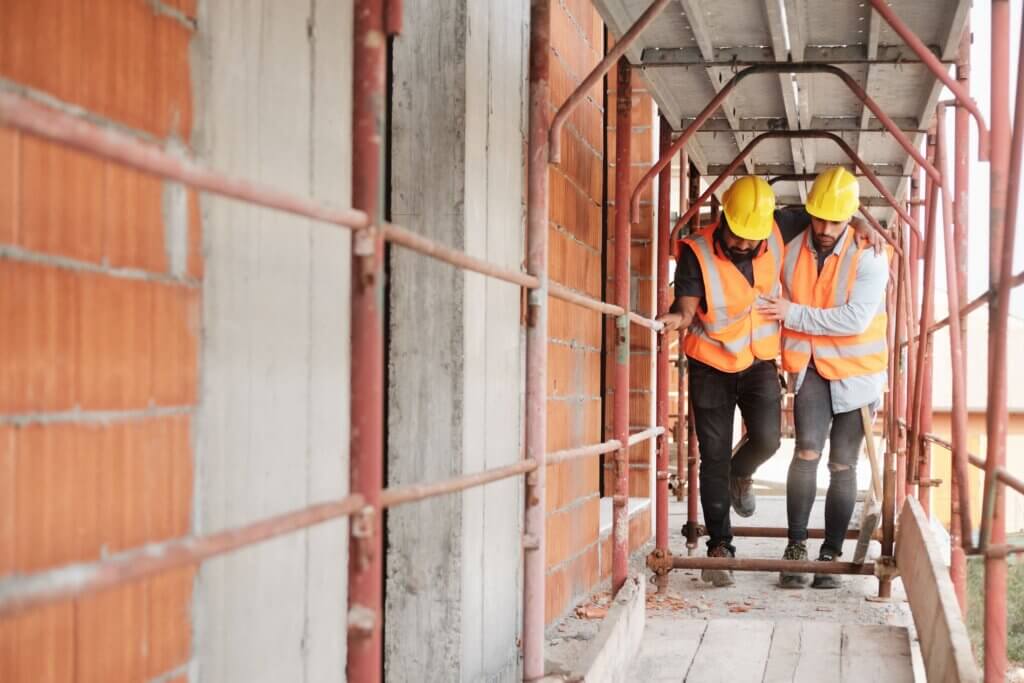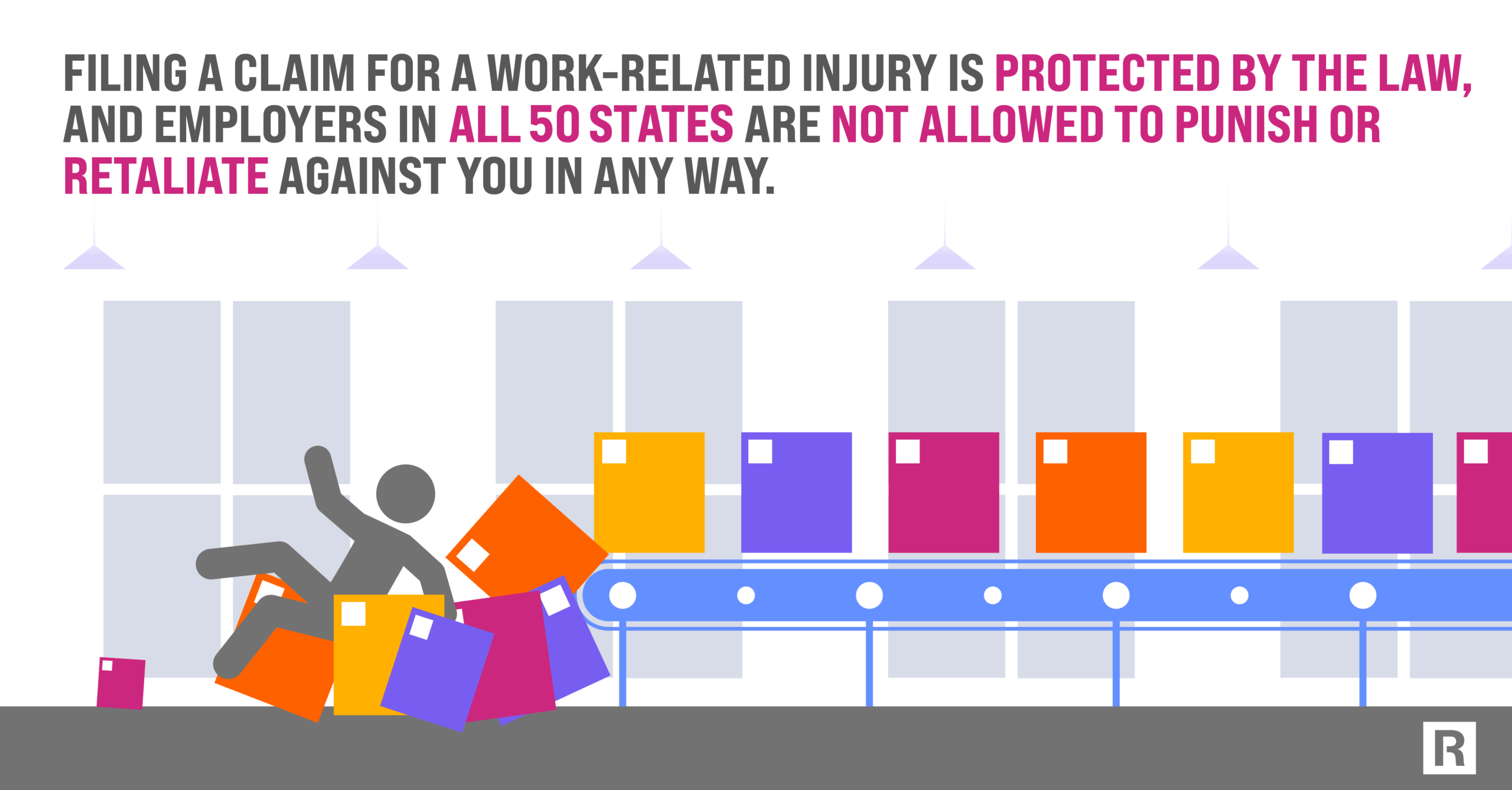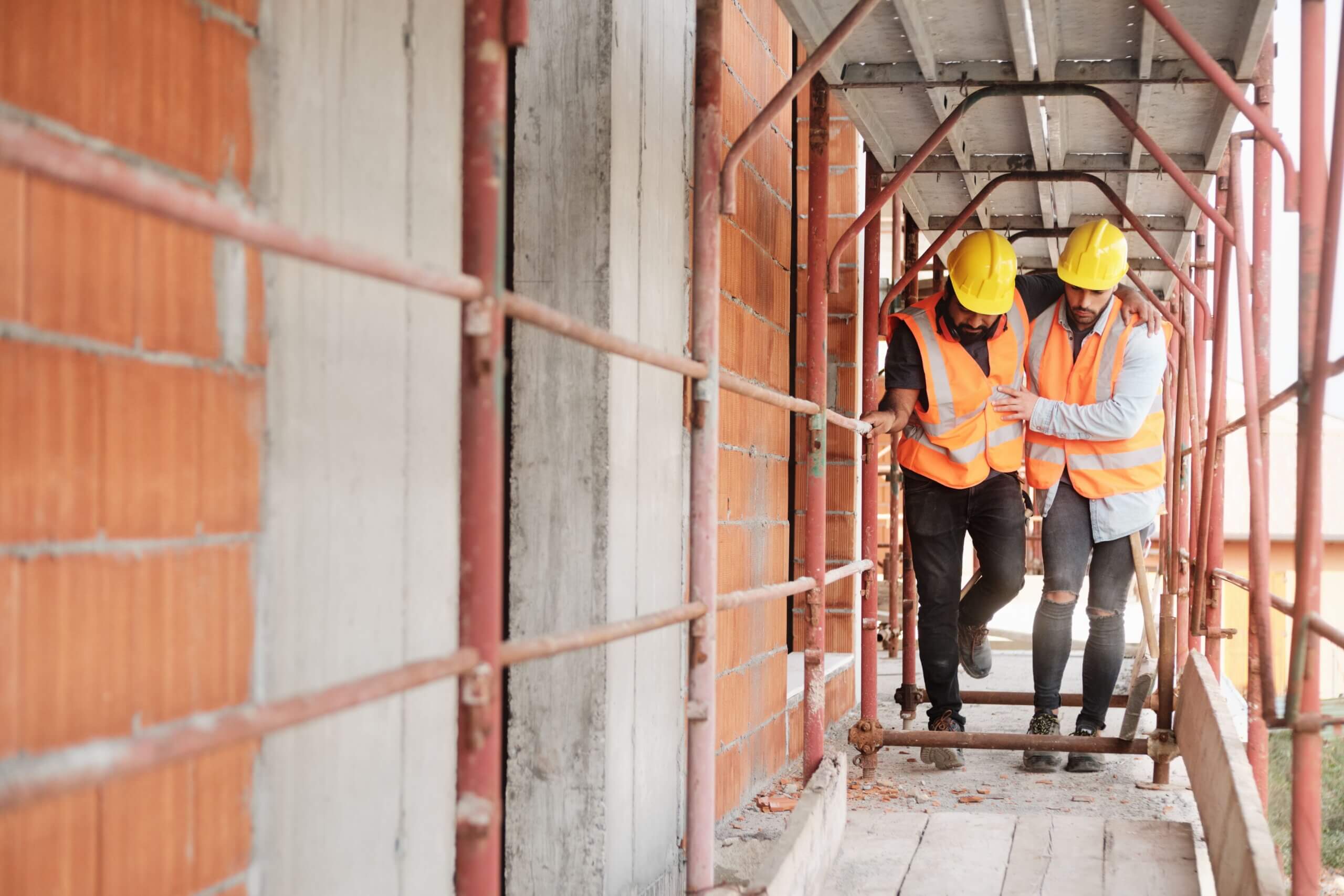
If you’re like most New Jersey residents, a good part of your day is spent at work. When there is a hazard on the property — whether it’s an office building, factory, construction site, or store — you rightfully expect that there will be some sort of warning or notification about the potential danger. But, if you fell and were injured at your workplace in New Jersey, and you believe it to be the fault of your employer, you will want to discuss your case with a New Jersey personal injury attorney because you may be entitled to compensation.
What Is a Slip and Fall Accident?
No two slips, trips, and/or falls take place under the same circumstances or end in the exact same result. For this reason, they can be much more complicated than they may seem. Generally speaking, a fall accident occurs when someone finds themselves in a hazardous situation and slips, trips, and/or falls, resulting in injury. The words “slip” and “trip” are often mistaken as being the same, however they have their own distinctions, outlined by The National Institute for Occupational Safety and Health (NIOSH). People normally “trip” when their foot hits a hard object such as a misplaced object on the ground or an incorrectly installed brick on a pathway. In contrast, people normally slip when they lose their footing on a surface that is wet or icy.
To be clear, accidents like this are not always 100% someone else’s fault; your own negligence may have played a role. In the end, blame may be allocated to your employer or an entity responsible for maintaining the property, you, and/or unavoidable weather conditions.
Premises Liability Law
In New Jersey, personal injury cases fall under premises liability law. This category of the law aims to compensate victims who suffer from injuries due to someone else’s conduct, no matter if the conduct occurred on purpose or negligently. However, a basic burden of proof will be the victim’s responsibility to show:
- whether someone else had a duty of care for the victim’s safety
- how that person breached this duty of care
- this breach in the duty of care caused the victim’s injury
In a New Jersey workplace, your employer will generally owe you a general duty of care that your workplace is safe, and if it is not, that you are supplied with proper notice, equipment, and whether the hazard(s) will be taken care of.
As an employee, your relationship with the property owner is that of a “business invitee.” As a business invitee, you are allowed to be on the property, have a role in keeping the business running, and are providing the landowner with benefits, while also having your own personal benefits. Due to this status, your employer will owe you the steepest duty of care to keep you safe at work.
What Does a New Jersey Workplace Settlement Cover?
Trying to figure out the implications of a slip and fall case on your own can be very challenging, and maybe even impossible to navigate on your own. When you contact your expert New Jersey personal injury attorney, they will help you determine what will be covered, who will likely take what amount of the liability, how much compensation you should be entitled to, and the likely outcome of your case.
After figuring out whether someone else is to blame for your accident, your attorney will figure out how much of your current damages will be covered, and whether any future effects of this injury will need to be addressed in your case. Generally speaking, especially if your employer is liable for the accident, you can recover most if not all of the losses you have already suffered from the injury, as well as any future costs you might face.
Let’s take a look at some examples of factors that could affect your compensation amounts:
- Medical treatment costs (current and/or future)
- Lost wages (current and/or future)
- Emotional trauma
- Expenses of dependants
- Pain and suffering
After most slip and fall injuries, you should seek medical attention to ensure you don’t have some serious damage, especially internal. With this comes missed work days if you cannot physically make it to work, perform your job duties, and/or need time off for mental health due to the trauma. It’s important to note that your injury does not need to be serious in order for you to have a viable case. Moreover, injuries that seem minor, like a sore back, may turn out to be more serious down the road (a herniated disc, for example).
The Role of Workers’ Compensation
Workers’ compensation has a purpose and duty to protect the rights of employees and employers by being the “middle man,” managing, rejecting, and/or delivering benefits as needed. In addition, workers’ compensation promotes workers’ and employer’s compliance with the law, which is why all businesses in New Jersey that are not already covered by federal programs are required to have workers’ comp insurance. Employers have some options in how they want to have this coverage, whether it is through a federal program, private insurance carrier, or (in rare instances) the employer’s own insurance. Showing proof of workers’ comp insurance is a requirement for businesses to receive business permits in New Jersey.
Workers’ comp may not be included in every form of employment, however. One type of employment where these benefits may get confusing is with temporary and/or independently contracted employees. Looking at Antheunisse v. Tiffany & Co., Inc., for example, Antheunissse sued Tiffany & Co. after she tripped over a foreign object on the floor and suffered serious knee injuries. In reality, Antheunisse was an independently contracted employee, who was only supposed to work with Tiffany & Co., Inc. temporarily. The court found that since she was a temporary employee loaned out to a “special employer” (Tiffany & Co.), the special employer is immune from a civil suit.

New Jersey’s Workers’ Comp, Disability, and Death Comparison
There are several different options available for an employee or their dependents when they are injured temporarily, permanently, or a work-related death occurs. Usually the employer’s insurance carrier will issue payments for medical treatment, lost wages, and/or permanent disability or death compensation. In New Jersey, the benefit amounts and procedures differ depending on the type of accident and the outcome of it. Let’s take a look at how they compare:
- Temporary Disability Benefits
- If the injured worker is disabled for longer than a week, their benefit rate may be 70% of their weekly wage, however this rate is not to exceed 75% of the Statewide Average Weekly Wage (SAWW), or fall below 20% of the SAWW.
- Permanent Partial Benefits
- This is when a job related accident results in a partial permanent disability, meaning temporary in some parts (e.g., sprains, dislocated limbs), and permanent in another part (e.g., back pain, heart problems, lung problems). The temporary benefits are due first, and when they stop, the permanent benefits are due.
- Permanent Total Benefits
- In the case of a permanent injury or illness that prevents a person from working, they may be entitled to permanent benefits. In New Jersey, these benefits will usually be provided in increments of 450 weeks and require the permanently disabled person to prove they are still unable to work after each period in order to renew benefits for another 450 weeks.
- Death Benefits
- If a worker dies from a fall at work, the dependents of that worker are eligible to receive death benefits. In New Jersey, the weekly benefits will be 70% of the weekly wage of the deceased worker and cannot exceed the maximum benefit amount established annually by the Commissioner of Labor. These benefits will be divided by a judge after hearings to establish how much dependency each person had to the deceased worker.
Each one of these categories have different rates, benefits, and restrictions. At Rosenblum Law, we make it our job to ensure that you, your employer, and their insurance are in compliance with the New Jersey law so you get the best possible outcome possible.
New Jersey’s Comparative Negligence Law
In New Jersey, the court system uses what is called the “modified comparative negligence rule,” which is very similar to New York’s law, but with one significant distinction. In New Jersey, if you are the injured party, and you are more than 50% responsible for the accident, you will not be entitled to compensation. If you are right at 50% liable, or less, you will be eligible to claim damages from your employer if you are injured at work.
The reason this rule is very important to keep in mind is because in almost every case, your employer will investigate and try to argue that you were at least partially, if not entirely, at fault for the accident. They will do this in order to save time and money for themselves and their insurance carriers. Let’s take a look at some possible arguments that could be made by your employer to shift some or all of the liability to you:
- You were willingly distracted at the time of your slip and fall accident (looking down at your cell phone, for example)
- The hazardous condition that caused your accident was obvious
- The spot in which your accident took place had warnings of the hazard(s)
- You trespassed in an area that you were not allowed to go
It can be very difficult to prove certain aspects of a slip and fall case against your employer because one of the things that the courts will look at in proving liability is whether your employer received notice of the hazardous condition prior to the accident. Usually this notice will have to give the employer a reasonable amount of time to respond to and correct the issue. For example, your employer may not be liable for a spill of a foreign substance such as coffee, if they did not receive notice, or if they only received notice minutes before you slipped and fell on the coffee spill. A defect in a property is usually much more likely to be proven and hold the employer liable, especially if you can get an expert such as an engineer to testify on the matter.
If your employer is successful in proving that your own actions/choices affected the incident, you could have your chances of compensation reduced or even eliminated in accordance with New Jersey’s modified comparative negligence rule. For example, if the sum of all of your expenses total $50,000 but the court finds that you were 50% responsible for your accident, you will only receive the 50% of the total damages, or $25,000. If the court finds you 51% liable for your injury at work, you will receive no compensation. This is the hard line that New Jersey’s modified comparative negligence rule draws. So, when working on a case, we build the strongest arguments possible to shift most of the blame for a fall away from our clients.
Statute of Limitations for Accidents in New Jersey
In New Jersey, the statute of limitations for filing a personal injury claim is two years. This means that from the time your injury occurred, the timer starts on the two years in which you must file your claim. If you do not file the lawsuit within this two year time limit, you will likely be barred from pursuing any compensation. You also don’t want to delay a lawsuit because, the more time goes by, the more details of a case can become inaccurate and evidence can be lost.

Common Causes of Falls at Work
New Jersey is a state with a large population, many workplaces, and dense areas. These factors create inherent challenges for keeping all kinds of premises safe for the general public, especially at workplaces where employers owe a responsibility of safety for their own employees and the general public. Slip and falls may occur at any time and any place, as the person who gets injured usually doesn’t foresee the accident. Below are some common things that can lead to a slip and fall accident in the workplace:
- Insufficient lighting on a walkway or stairway
- No signage warning people of hazards
- Damaged and/or defective walkways
- Missing or damaged handrails
- Construction site negligence
- Unsecured cords or cables
- Lack of weather maintenance on a walkway or stairway
- Failure to fix leaks
- Lack of stairway or platform maintenance
- Failure to repair damaged walls/ceilings
- Falling debris
- Loose floor tiles
Most people do not think of these hazards on a daily basis, nor do most people notice them when they are in plain sight. For example, if your workplace has been ignoring some hazards over a long period of time, you may be used to these hazards being where they are, and may not even notice them anymore. These hazards may be present in any workplace and could appear at any time, which is why you need to be careful, report it to your employer in a timely manner, and if they don’t do anything to fix it, and it causes injury, speak to an expert personal injury attorney.
Related Facts and Statistics
In 2019, 16 people died due to a fall at work, according to data from the Bureau of Labor Statistics. Many more were injured but survived their accidents. Nationally, slip and falls are the leading cause of claims for workers’ comp and the leading cause of occupational injuries for people who are of the ages of 55 and older. Men accounted for 93% of work-related fatalities in New Jersey, which is similar to the national percentage. Slip and falls are the leading cause of compensable injuries in the trucking industry, according to the American Trucking Association. In 2019, there were 5,333 fatal workplace injuries, which was the highest annual number since 2007.
Frequently Asked Questions
What if I am injured in a slip and fall accident outside of my normal work hours, but while still performing work duties?
It depends. A recent New Jersey Supreme Court case, Goulding v. NJ Friendship House, Inc., dealt with a very similar type of issue. An employee volunteered for a family fun day for the company’s clients where she did not participate in any recreational duties. She was simply doing the volunteer work she signed up to do when she slipped and fell, injuring her ankle. The New Jersey Supreme Court made clear that the employee’s attorney successfully proved that this event was for the overall benefit of the employer, and that she was not there to engage in recreational activities, but to simply volunteer for her employer. For these reasons, the court ruled that she should be covered by workers’ comp benefits.
So basically, yes, you can be covered so long as: (1) you are performing work duties that overall benefit your employer; and (2) you are not engaged in the duties for your own recreational purposes or solely for your own benefit, outside of work.
Could my workplace fire me or retaliate against me for suing for a slip and fall accident?
If it is in any way related to your slip and fall accident, such as revenge, then no. Retaliation is when your employer mistreats you or punishes you for what you have brought against them, in this case, your personal injury claim. If you think your employer is retaliating against you in any way, contact an attorney right away. Filing a claim for a work-related injury is protected by the law, and employers in all 50 states are not allowed to punish or retaliate against you in any way. Retaliation may not be as obvious as work termination, it can also include a change in work responsibilities, change in pay, communication changes, and not giving you the same access to opportunities as before.
Can a judgement for workers’ comp for or against me be appealed and reversed? If so, what are some of the implications?
Within the state’s limitations, yes. In New Jersey, you have 45 days from the date of a judgement to file an appeal. If you miss this deadline, you may be barred from appealing a judgement indefinitely, unless your case is deemed an exception by the court. Once a judgement is reversed, the court may also order one party to reimburse all prior payments. In Malone v. Pennsauken Bd. of Educ., a man in New Jersey was injured claiming that the injury happened due to physical stresses of his job over the years. He was awarded over $100,000 in permanent benefits and additional temporary benefits. Upon reversal of the judgement during the appeal, the claimant was ordered to reimburse his prior benefits.
Who Should You Contact?
If you were injured by a fall at work, you will need the guidance, support, and expertise of a highly dedicated legal team. At Rosenblum Law, we have decades of experience in getting our clients the best possible outcomes and providing unmatched attention to individual cases. Give yourself the best chance at the compensation you deserve by taking the crucial first step on your road to recovery. E-mail or call 888-815-3649 us for a free consultation.
Other Resources
New Jersey Department of Labor and Workforce Development on Injury Benefits
State of New Jersey Workers’ Compensation Law
Why You Should See a Doctor After a Fall










 888-815-3649
888-815-3649
